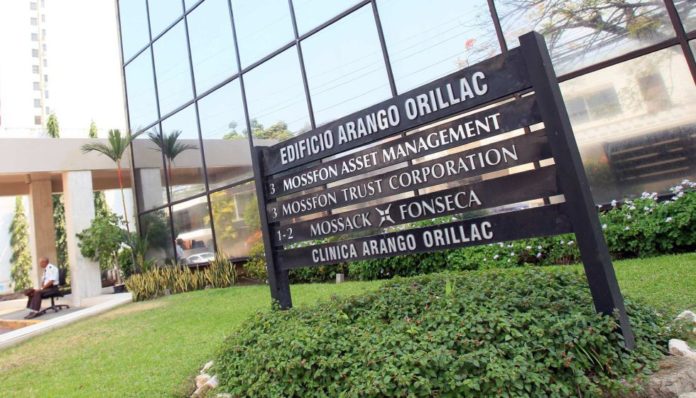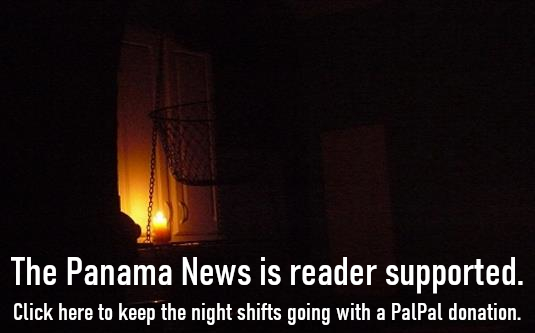The banking district office is history, as the Panama Papers notoriety shut down the Mossack Fonseca law firm. The Public Ministry objects to the term “Panama Papers” and insists upon Mossack Fonseca Papers, but that’s a hard sell to a world that has seen dozens of high-profile cases that have ruined careers of the powerul and embarrassed the rich while Panama was taking no action. Public Ministry archive photo.
After a nearly six-year investigation, Panama Papers
money laundering schemes are set for trial in Panama
by Eric Jackson
The show is set to begin on the morning of November 15 at the Balboa Theater. The balcony may be crowded with reporters from the national and international press. Surely the guards won’t allow spectators to use the balcony to throw peanuts at the defendants, let alone the prosecutors or judges.
In April of 2016 the International Consortium of Journalists made its public debut by revealing and reporting on some 11.5 million documents leaked to it from the files of the Mossack Fonseca law firm. These told tales of politically connected criminals — or should we say criminally involved politicians? — who used the firms services to squirrel away funds and conceal evidence of wrongdoing. Other documents showed apparent tax evasion by the rich and famous.
The first politician to fall because of the scandal was Iceland’s premier, Sigmundur Davíð Gunnlaugsson — who may not have committed any crime but along with his wife used the firm to conceal their investments. Likewise, British Prime Minister David Cameron ultimately had to step down not because he, but his father Ian, had used the firm’s services. Pakistani Prime Minister Nawaz Sharif was forced out over his family’s concealment of an international real estatempire with the firm’s assistance. The king of Saudi Arabia led a star-studded list of at least 105 prominent politrically exposed persons (PEPs in the financial crimes watchdog business) who were Mossack Fonseca clients. The firm’s political clients were from left, right and center. Folks from Vladimir Putin’s inner circle were named but relatively few Americans were. That led to Russian media claims that The Panama Papers was a CIA operation. From subsequent offshore revelations, however, it just seems that the Americans tended to take their offshore asset manipulations to rival law firms in Panama or elsewhere.
The list of Panamanian PEPs associated with the scandal begane with Ramón Fonseca Mora, one of the firm’s principals and at the time of the revelations the chief of staff and minister without portfolio for forme president Juan Carlos Varela. (The two men have since fallen out.) In 2016 the overseas missions of Panama’s Ministry of Foreign Relations were liberally salted with members of the extended Mossack and Fonseca families. Beyond the family and party ties, the Panamanian legal profession rose up nearly in unison to defend the firm and its principals, generally in the name of protecting the principle of attorney-client privilege.
The firm was founded in Panama by German immigrant Jüergen Mossack in the 1970s, while Panama City native Ramón Fonseca Mora joined it in the 1980s. It was not just a Panamanian operation. The law firm or its subsidiaries had offices in the United States, China, several European countries, British jurisdictions, Brazil and several other Latin American countries. By some estimates it formed half of Panama’s offshore corporations held bty foreigners and was the world’s fourth-largest offshore law firm. The two founders have been de facto restricted from travel outside Panama, which does not extradite citizens, since at least October of 2020 when Germany issued an international warrant for their arrests. Even before then the odds were that some jurisdiction or another had issued a sealed accusation that could be made public if and when they were found to be abroad.
The protests, defenses and interposed delays may have worked in Panama, and still might get the 32 defendants off the hook. (Who ARE they? The prosecution isn’t saying but AFP reports that both Ramón Fonseca Mora and Jüergen Mossack are among the accused to go on trial.) What may somewhat work for public consumption in Panama, however, tends to draw only scorn abroad. International pressure against Panama, which includes financial sanctions imposed by various jurisdictions, has only increased since the stories broke.
The case to be tried at the Balboa Theater will be founded upon two general types of allegations. One is about money laundering through real estate transactions, which can take on many different forms. The other is about the creation of shell corporations — not only in Panama — and arranging them in chains with secret bank accounts in order to facilitate bribery and graft.
In her January 25 order Judge Baloisa Marquínez dropped charges against 13 defendants, nine of them based on statutes of limitations, and ordered 32 others to stand trial.
Contact us by email at fund4thepanamanews@gmail.com
To fend off hackers, organized trolls and other online vandalism, our website comments feature is switched off. Instead, come to our Facebook page to join in the discussion.
These links are interactive — click on the boxes













